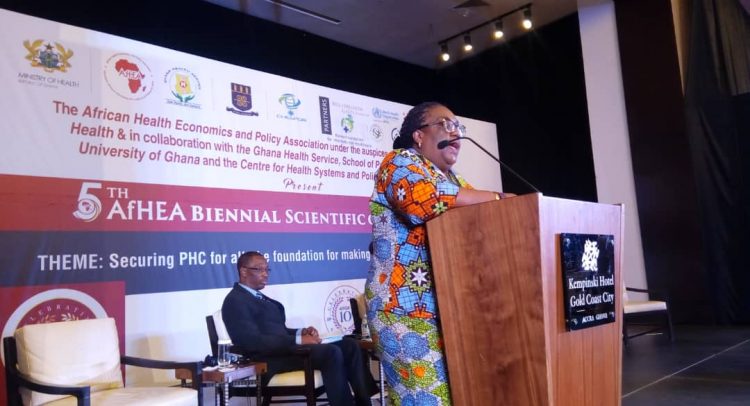Dr. Lydia Dsane-Selby
ACTING CHIEF Executive Officer (CEO) of the National Health Insurance Scheme (NHIS), Dr. Lydia Dsane-Selby, has indicated that it is possible for Ghana and other African nations to achieve the Universal Health Coverage (UHC).
She stated that African countries have to adapt to the UHC and fit it into their respective national contexts.
Dr. Dsane-Selby said these while making a presentation on the operations of the NHIS at the fifth African Health Economic and Policy Association (AfHEA) annual conference plenary session two on Tuesday, March 12, 2019 in Accra.
The session, co-sponsored by the World Bank and the Korea Foundation for International Healthcare, aimed at presenting achievements of the health financing system of Ghana and how the country is on its way to UHC and to learn from other countries.
The focus of the session was on how to ensure sustainability of health financing systems while aiming for greater equity.
Making a presentation under the theme: ‘Ghana’s road to Universal Health Care,’ Dr. Dsane-Selby observed that Ghana and other African countries must look at disease prevention and health promotion if they want to achieve UHC.
Universal health coverage, according to the World Health Organization (WHO), means that all people and communities can use the promotive, preventive, curative, rehabilitative and palliative health services they need, of sufficient quality to be effective, while also ensuring that the use of these services does not expose the user to financial hardship.
Sharing experiences on Ghana’s preparation towards achieving UHC, she indicated that the West African nation was paying close attention to the three dimensions of UHC which include: population, benefit package, and financial aspect.
She disclosed that Ghana health insurance currently covered about 37 percent of its population.
According to her, 68 percent of NHIS’s members were exempted from premium payment.
Members exempted from premium payment, she observed, included persons under age 18, pregnant women and children.
The Acting CEO stated that the current 11.2 hours spent on the renewal NHIS’s membership was unacceptable.
She expressed the hope that the Ghana Card would allow beneficiaries to register onto NHIS through the use of mobile technologies.
Dr. Dsane-Selby explained that Ghana was looking at a population base payment system to ensure that the scheme covers everybody, urging that “we need to look for initiatives to change the narratives around our membership.”
According to her, there were currently 4,385 service providers under the NHIS.
Dr. Dsane-Selby observed the need for every citizen, especially the poor to be brought onboard the health insurance scheme.
Experiences of South Korea’s Health Insurance policy were shared at the plenary.
Korea achieved its UHC over a period of 12 years.
BY Melvin Tarlue


